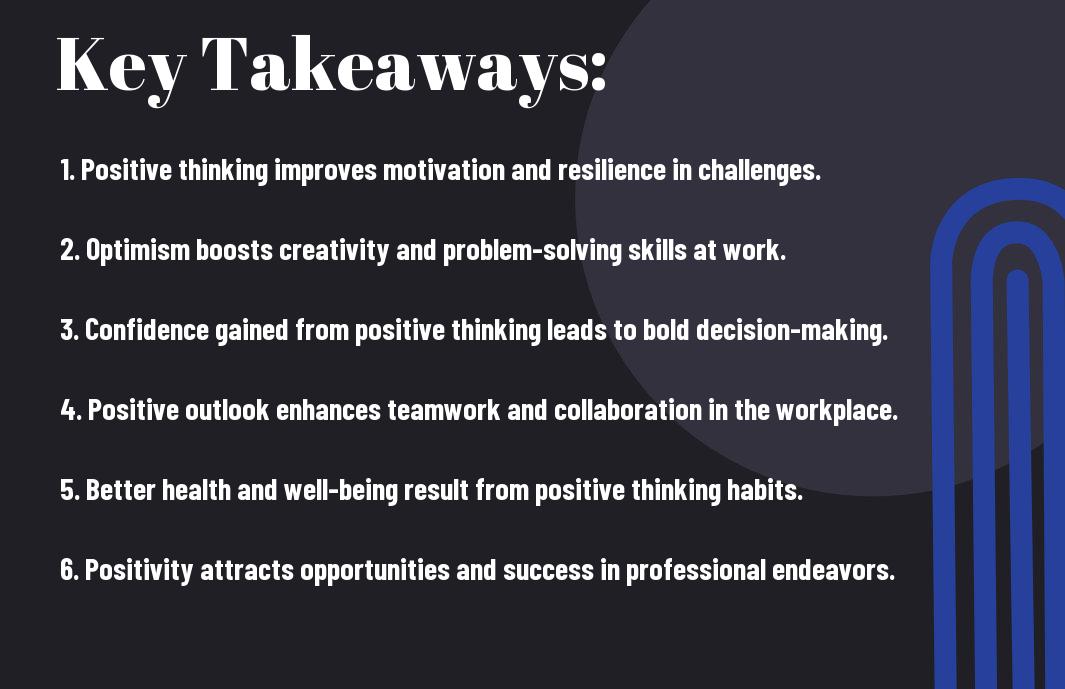Embracing positive thinking can be a powerful tool in achieving professional success. Cultivating a positive mindset not only influences your outlook on challenges but also impacts your ability to navigate the complexities of the workplace. Research indicates that individuals who maintain a positive attitude are more likely to be resilient in the face of setbacks and exhibit higher levels of productivity and creativity. By harnessing the benefits of positive thinking, professionals can cultivate a mindset that paves the way for career growth and achievement.
Key Takeaways:
- Positive thinking breeds resilience: A positive mindset helps professionals navigate challenges and setbacks with resilience and optimism.
- Enhances problem-solving skills: Positive thinking enables individuals to approach problems creatively and find effective solutions.
- Improves relationships: Optimistic professionals tend to build strong relationships with colleagues, clients, and stakeholders, fostering a positive work environment.
- Boosts motivation and productivity: Positive thinking fuels motivation, leading to increased productivity and improved performance at work.
- Enhances overall well-being: Adopting a positive mindset not only benefits professional success but also promotes overall well-being and mental health.

Understanding Positive Thinking
Definition and Core Concepts
If you want to harness the benefits of positive thinking for professional success, it is crucial to understand what positive thinking entails. Positive thinking is a mental attitude that focuses on the good and expects favorable outcomes in every situation. This mindset involves shifting your perspective towards optimism, gratitude, and possibilities, even in challenging circumstances.
Core concepts of positive thinking include affirmations, visualization, gratitude, and resilience. Affirmations are positive statements that you repeat to yourself to challenge and overcome self-sabotaging and negative thoughts. Visualization involves picturing your goals achieved in vivid detail to enhance motivation and confidence. Gratitude is the practice of acknowledging and appreciating the good in your life, fostering a sense of abundance. Resilience is the ability to bounce back from setbacks and see failures as temporary obstacles on the path to success.
Psychological Research on Positivity
If you examine into psychological research on positivity, you will find a wealth of evidence supporting the power of positive thinking in enhancing well-being and success. Studies have shown that individuals with an optimistic outlook tend to have better physical health, lower stress levels, and higher job performance. Positive thinking has been linked to increased creativity, improved problem-solving skills, and greater resilience in the face of challenges.
Researchers have also discovered that positive thinking can lead to a more proactive and open-minded approach to opportunities, ultimately resulting in higher levels of achievement and satisfaction in various aspects of life. By cultivating a positive mindset, individuals can improve their relationships, boost their mental health, and increase their overall quality of life.
Do you find yourself stuck in familiar and comfortable zones, unable to take the leap towards success? Introducing a transformative guide that delves into the hidden forces holding you back from achieving your full potential.
Click the image to learn more about "The Science of Success."
Positive Thinking in the Professional Realm
Impact of Positivity on Career Progression
Career progression is heavily influenced by an individual’s mindset and attitude towards their work environment. Unlike individuals with a negative outlook, those who maintain a positive mindset tend to excel in their professional endeavors. Positive thinking can lead to increased productivity, higher job satisfaction, and positive relationships with colleagues and superiors.
Positivity creates a ripple effect in the workplace, enhancing teamwork, collaboration, and overall performance. When facing challenges or setbacks, individuals with a positive mindset are more likely to persevere, adapt, and find opportunities for growth and development.
Strategies for Cultivating a Positive Mindset at Work
Strategies to cultivate a positive mindset at work include practicing gratitude, mindfulness, and self-care. Incorporating positive affirmations and visualization techniques can also help individuals stay focused, motivated, and resilient in the face of adversity.
Engaging in regular exercise, setting achievable goals, and seeking feedback for continuous improvement are vital components of fostering a positive mindset at work. By prioritizing self-awareness and emotional intelligence, professionals can navigate challenges with a positive attitude and mindset.
Work environments that promote positive thinking and emotional well-being tend to have lower turnover rates, higher employee satisfaction, and increased productivity. Investing in initiatives that support positive mental health can lead to a more engaged, fulfilled, and successful workforce.
Implementing Positive Thinking Techniques
After understanding the importance of positive thinking in achieving professional success, it is crucial to implement techniques that can help cultivate a positive mindset in your daily life. By adopting daily practices and strategies to overcome challenges and negative thought patterns, you can harness the benefits of positive thinking to propel yourself towards your professional goals.
Daily Practices for Maintaining Positivity
One way to maintain positivity on a daily basis is to start each day with a positive affirmation. Take a few moments in the morning to focus on positive thoughts and affirmations that set the tone for your day. This can help shift your mindset towards a more optimistic outlook and enhance your overall mood. Additionally, practicing gratitude by reflecting on things you are thankful for can help cultivate a sense of positivity and abundance in your life.
Overcoming Challenges and Negative Thought Patterns
Negative thought patterns can often derail your professional success by fostering self-doubt, fear, and pessimism. To overcome these challenges, it is important to identify and challenge negative thoughts as they arise. Replace negative self-talk with positive affirmations and empowering beliefs to shift your mindset towards a more positive direction. Engaging in mindfulness practices can also help you become more aware of your thoughts and emotions, allowing you to respond to challenges in a calm and rational manner.
Overcoming challenges and negative thought patterns requires consistent effort and practice. It is essential to commit to a positive mindset and belief in your abilities even in the face of setbacks. By reprogramming your thoughts and focusing on solutions rather than problems, you can overcome obstacles and achieve success in your professional endeavors.
Positive Thinking and Leadership
Despite the challenges that come with leadership roles, maintaining a positive outlook can greatly impact the success of a leader. Harnessing the Benefits of Positive Thinking: A Path to Success and Happiness’ article explores the ways in which positive thinking can shape leadership effectiveness and overall team dynamics.
The Role of Positivity in Effective Leadership
Positivity is not just a personal trait; it’s a strategic tool for leaders to inspire and motivate their teams towards a common goal. Leaders who exude positivity create a productive and collaborative work environment where individuals feel valued and motivated to perform at their best. When faced with challenges, positive leaders maintain a solution-oriented mindset that encourages creativity and innovation within the team.
Inspiring Teams through Positive Communication
Effective leadership is not just about giving orders; it’s about fostering a culture of open communication and positive interaction within the team. Leaders who communicate in a constructive and empowering manner build trust and inspire loyalty among team members. By actively listening and providing encouragement, leaders can boost morale and create a unified team that is resilient in the face of challenges.
The impact of positive communication goes beyond just exchanging information; it establishes a foundation of trust and respect that enables teams to work together harmoniously towards achieving shared goals. Effective leaders understand that their words and actions have a profound effect on team dynamics and use positive communication as a powerful tool to motivate and inspire their teams.
Summing up
Ultimately, harnessing the benefits of positive thinking for professional success is a powerful tool that can transform your career. By adopting a positive mindset, you can boost your confidence, increase your resilience in the face of challenges, and enhance your overall well-being. Positivity can help you navigate the complexities of the workplace with grace, attract opportunities for growth, and build stronger relationships with colleagues and clients. Embracing positive thinking is not about denying reality, but about approaching challenges with a proactive and solution-focused mindset. By incorporating positivity into your professional life, you can unlock your full potential and achieve greater success in your career.
FAQ
Q: What is positive thinking?
A: Positive thinking is the practice of focusing on the good in any situation and expecting positive outcomes. It involves shifting your mindset to see the bright side of things and believing in your ability to overcome challenges.
Q: How can positive thinking benefit professional success?
A: Positive thinking can benefit professional success by improving motivation, creativity, resilience, and productivity. It can also enhance relationships with colleagues and clients, leading to greater opportunities for growth and advancement in your career.
Q: What are some strategies for harnessing the benefits of positive thinking in the workplace?
A: Some strategies for harnessing the benefits of positive thinking in the workplace include practicing gratitude, visualizing success, reframing negative thoughts, setting realistic goals, surrounding yourself with positive influences, and staying adaptable in the face of challenges.
Q: How can positive thinking help in overcoming setbacks and obstacles in a professional setting?
A: Positive thinking can help in overcoming setbacks and obstacles in a professional setting by enabling you to approach challenges with a solutions-oriented mindset, learn from failures, stay resilient in the face of adversity, and maintain a sense of optimism and confidence in your abilities.
Q: What are some signs that indicate the need to improve positive thinking for professional success?
A: Some signs that indicate the need to improve positive thinking for professional success include chronic negativity, feelings of self-doubt or low confidence, difficulty in coping with stress, strained relationships with colleagues, and a lack of motivation or enthusiasm at work.








